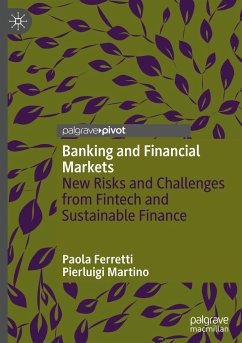
Social Bonds
An Alternative Form of Investment to Meet Social Needs

PAYBACK Punkte
38 °P sammeln!
Can finance help mankind? We are accustomed to reading sad news about money. Apparently, money is often associated exclusively with illicit trafficking, and it seems that only the wicked benefit from it, while good people are crushed by a system that exploits them. Is this true? Is this the reality of our world? Perhaps money is merely a tool. What truly matters is the intention behind its use. Consider the positive impact that can be achieved through charitable acts.This book introduces and discusses the concept of social bonds as instruments created to enhance collective welfare. Nevertheles...
Can finance help mankind? We are accustomed to reading sad news about money. Apparently, money is often associated exclusively with illicit trafficking, and it seems that only the wicked benefit from it, while good people are crushed by a system that exploits them. Is this true? Is this the reality of our world? Perhaps money is merely a tool. What truly matters is the intention behind its use. Consider the positive impact that can be achieved through charitable acts.
This book introduces and discusses the concept of social bonds as instruments created to enhance collective welfare. Nevertheless, the characteristics of social bonds allow for individual well-being as well. Social bonds can yield a return and ensure repayment of the principal upon maturity. They can be perceived as an alternative to donations for those who support them or as a means of diversification for those interested in personal gain. The ultimate purpose of the investment holds little significance.What truly matters is the allocation of resources towards ethical endeavors.
Currently, social bonds constitute a niche market, yet they harbor significant potential for development. This book proposes a global examination of the subject matter. The analysis delves into the social reality implemented worldwide, focusing on economic aspects such as risk and return, fundraising, successes, and failures. Additionally, the author explores the advantages and disadvantages of these instruments to provide a comprehensive study of the sector.
This book introduces and discusses the concept of social bonds as instruments created to enhance collective welfare. Nevertheless, the characteristics of social bonds allow for individual well-being as well. Social bonds can yield a return and ensure repayment of the principal upon maturity. They can be perceived as an alternative to donations for those who support them or as a means of diversification for those interested in personal gain. The ultimate purpose of the investment holds little significance.What truly matters is the allocation of resources towards ethical endeavors.
Currently, social bonds constitute a niche market, yet they harbor significant potential for development. This book proposes a global examination of the subject matter. The analysis delves into the social reality implemented worldwide, focusing on economic aspects such as risk and return, fundraising, successes, and failures. Additionally, the author explores the advantages and disadvantages of these instruments to provide a comprehensive study of the sector.












